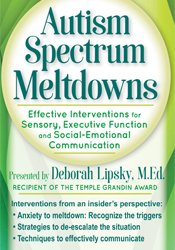Description
- What causes the unusually strong reactions of a meltdown?
- Can you see it coming?
- Is it a meltdown or a tantrum?
- Is it willful, manipulative behavior?
- Is ‘Fight or Flight’ the only option?
Individuals on the autism spectrum often react very strongly to seemingly minor changes in routine, patterns, food, clothing, noise, and a host of other environmental factors. Understanding and recognizing personal triggers will be a major benefit in developing a plan for yourself or individuals you work with to lower the levels of anxiety and avoid a catastrophic reaction.
Deborah Lipsky, M.Ed., presents a rare and unique perspective from someone who lives with autism every day. Through a combination of personal experiences with professional knowledge she will offer you a rare glimpse into the neurological processing differences of an individual with autism and explain the physical and mental processes of a meltdown. You will participate in interactive exercises where you are “autistic” for a moment to gain a greater appreciation of the challenges individuals with autism face. You will learn how to recognize the differences between a meltdown and a behavioral tantrum and what can trigger a meltdown. You will walk away with effective intervention strategies to use before, during, and after a meltdown.
CPD
CPD
This online program is worth 6.0 hours CPD.
Speaker
Board Member
Autism Society of Maine
Deborah Lipsky, M.Ed., is an accomplished presenter traveling the United States and Canada delivering seminars, presentations, workshops, and keynote addresses on understanding autism from an insider’s viewpoint. In 2005, she was awarded the Autism Society of Maine’s outstanding volunteer award, and in 2006, she became the recipient of the Temple Grandin award for “outstanding success in her life thereby being an inspiration to others.”
Mrs. Lipsky became an international bestseller with Managing Meltdowns (2010), a book based on her S.C.A.R.E.D. model, an intervention guide full of strategies to help first responders and anyone witnessing an individual with autism having a catastrophic reaction (meltdown). In her second book, From Anxiety to Meltdown (2011), the focus is on understanding anxiety and how it influences thoughts and behaviors in individuals on the spectrum. It also is the first book to truly distinguish the difference between tantrums and meltdowns and offers numerous strategies to deal with both. Mrs. Lipsky also wrote a chapter on learning social skills from animals and is featured on the cover of the book “Autism All Stars”, edited by Josie Santomauro and published by Jessica Kingsley Publishers. Her third book on the nature of demons and spiritual warfare was released by Tau Publishers in the fall of 2012. Mrs. Lipsky’s fourth book, How People with Autism Grieve, and How to Help (2013), is an honest, first-hand account of how people with autism deal with the loss of someone in their life.
Mrs. Lipsky has been featured in a documentary along with Temple Grandin called, “Making Our Way” which was produced for Maine Public Broadcasting Television by Dan Lambert. In 2015 the documentary about her life, “Living with Autism”, also produced by Dan Lambert, was released and is available on DVD.
Speaker Disclosures:
Financial: Deborah Lipsky receives royalties as an author for Jessica Kingsley Publishers. She receives a speaking honorarium from PESI, Inc. She has no relevant financial relationships with ineligible organizations.
Non-financial: Deborah Lipsky is an adult with high functioning autism. She is a member of the Autism Society of Maine.
Objectives
- Design a sensory conducive friendly environment for an individual on the autism spectrum to improve their level of functioning.
- Articulate the impact of communication dysfunction on learning, behavior and social interactions in clients diagnosed with autism spectrum disorder.
- Describe the neurological and physiological processes of meltdowns in a person diagnosed with autism and utilize this information when selecting a treatment intervention.
- Utilize clinical strategies to de-escalate a meltdown based on sensory, anxiety, communication or executive function triggers.
- Differentiate between a meltdown and a behavioral tantrum in clients with autism and apply appropriate clinical strategies to de-escalate the situation.
- Design and implement an individualized intervention/crisis plan for your clients with Autism Spectrum Disorder.
Outline
The Neurological and Physiological Differences of Autism
- Sensory and Visual Environments
- Sensory evaluation: Asking the right questions
- Large motor skills, fine motor skills, eating, hearing, smell, touch
- Creating a sensory friendly environment
- Impact of sensory dysfunction on learning, behavior and social interaction
- Executive Function (EF)
- Impact of EF on daily life
- EF manifestations seen in meltdowns
- Strategies to limit consequences of EF
- Social/Emotional Communication
- Common pitfalls in communicating with individuals with autism
- Communication differences with autism
- Impact on learning, behavior and social interaction
- Strategies to help facilitate communication
Anxiety to Meltdown
- Recognizing the triggers
- What does a meltdown look like?
- What a person with autism experiences during a meltdown
- Common behaviors seen in meltdowns
- Meltdown or tantrum?
Effective Behavioral Interventions Based on the S.C.A.R.E.D. Model
- Behavior as a form of communication
- Inappropriate interventions … What never to do
- Appropriate strategies to de-escalate the situation
- Intervention in the school system
- Creating a personalized intervention/crisis plan
Target Audience
Speech-Language Pathologists, Speech-Language Pathology Assistants, Social Workers, Occupational Therapists, Occupational Therapy Assistants, Special & General Education Teachers, School Administrators, Educational, Paraprofessionals, Counselors, Psychologists, Board Certified Behavior Analysts, Marriage and Family Therapists
Reviews
Overall:
4.3
Total Reviews: 15


 Online CourseFrank Anderson’s Master Class in Internal Family Systems Therapy£129.98£999.98Frank Anderson’s Master Class in Internal Family Systems Therapy29 Jan, 2024Frank Anderson’s Master Class in Internal Family Systems Therapy£129.98£999.98 value
Online CourseFrank Anderson’s Master Class in Internal Family Systems Therapy£129.98£999.98Frank Anderson’s Master Class in Internal Family Systems Therapy29 Jan, 2024Frank Anderson’s Master Class in Internal Family Systems Therapy£129.98£999.98 value Online CourseDr Laurel Parnell’s Attachment-Focused EMDR Skills and Supervision Group£495.00£1,590.00Dr Laurel Parnell’s Attachment-Focused EMDR Skills and Supervision Group14 Jan, 2025Dr Laurel Parnell’s Attachment-Focused EMDR Skills and Supervision Group£495.00£1,590.00 value
Online CourseDr Laurel Parnell’s Attachment-Focused EMDR Skills and Supervision Group£495.00£1,590.00Dr Laurel Parnell’s Attachment-Focused EMDR Skills and Supervision Group14 Jan, 2025Dr Laurel Parnell’s Attachment-Focused EMDR Skills and Supervision Group£495.00£1,590.00 value BookWritten by three leading experts in the fields of disordered eating, mental health, and trauma-informed care, this book will become your go-to guide for learning how to reject diet culture, heal your£18.99Written by three leading experts in the fields of disordered eating, mental health, and trauma-informed care, this book will become your go-to guide for learning how to reject diet culture, heal your20 Feb, 2024Written by three leading experts in the fields of disordered eating, mental health, and trauma-informed care, this book will become your go-to guide for learning how to reject diet culture, heal your£18.99
BookWritten by three leading experts in the fields of disordered eating, mental health, and trauma-informed care, this book will become your go-to guide for learning how to reject diet culture, heal your£18.99Written by three leading experts in the fields of disordered eating, mental health, and trauma-informed care, this book will become your go-to guide for learning how to reject diet culture, heal your20 Feb, 2024Written by three leading experts in the fields of disordered eating, mental health, and trauma-informed care, this book will become your go-to guide for learning how to reject diet culture, heal your£18.99 Online CourseCBT-I To Treat Insomnia: Proven Interventions That Go Beyond Sleep Hygiene£0.00£149.00CBT-I To Treat Insomnia: Proven Interventions That Go Beyond Sleep Hygiene12 Dec, 2024CBT-I To Treat Insomnia: Proven Interventions That Go Beyond Sleep Hygiene£0.00£149.00 value
Online CourseCBT-I To Treat Insomnia: Proven Interventions That Go Beyond Sleep Hygiene£0.00£149.00CBT-I To Treat Insomnia: Proven Interventions That Go Beyond Sleep Hygiene12 Dec, 2024CBT-I To Treat Insomnia: Proven Interventions That Go Beyond Sleep Hygiene£0.00£149.00 value













